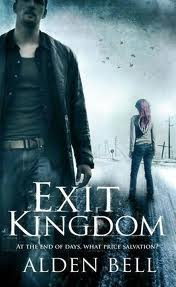Having
been ambushed in San Francisco, which is now fully engulfed in the
zombie plague, Ashley and the wild cards must pursue the enemy to San
Diego. There they will discover a splinter of their own organization,
the Dolofónoi tou Zontanoús Nekroús, which seeks to weaponize the
plague. But that isn’t the worst news. The plague has gone airborne,
making it transferable without physical contract. It cannot be
controlled by anyone, so reports of the zombie swarm are coming in from
across the United States—and across the world.
Yep,
when I said there were only a couple more zombie series that I was
waiting to finish reading, before quitting the genre for good, Dana
Fredsti's series is one of them. Despite their veering into Urban
Fantasy territory at times (nothing wrong with that, just not something
that I'm interested in), the 'Ashley Parker' books have been a lot of
fun to read and there was never any doubt that I would be around to see
the conclusion. I'm assuming that 'Plague World' is the final book by
the way although I could be wrong. With the way that the titles have
gone ('Plague Town' and 'Plague Nation') it's hard to see where the
series could go after 'Plague World'. 'Plague Moon' might be a
possibility (although I wouldn't have thought so) but I can't see it
going any further than that. And that's fine. Everything has to end and
it's always best to end on the best note that you can. Like 'Plague
World'; a book where, if it is the last in the series, rounds things off
in the best that it can.
I
seem to find myself saying this a lot just recently but 'Plague World'
doesn't really do anything new when set against the preceding two books.
Various relationships are played out against an increasingly violent
zombie apocalypse and Ashley finds herself having to make tough (even
heart wrenching decisions) just to survive each day. People who have
read the first two books will see instantly that nothing has really
changed in the delivery and, in fairness, we shouldn't really expect it
to. This is how the series has built itself up and, three books in, you
shouldn't really expect any massive changes.
I'm
not a hundred percent sure how I feel about this though. I shouldn't
expect a big change (and especially not when Fredsti has far more
important matters on her hand in terms of tying everything together) but
I couldn't help but feel like a change in pace perhaps, or some real
surprises (more on that in a bit) could have really made the difference.
Like
I said though, Fredsti has a series to conclude (or plot-arc, I still
can't decide whether there are any more books to come) and she does it
pretty damn well, tying up loose ends amidst a backdrop of zombies and
secret government organisations gone rogue. It's an explosive finale
even if some of the revelations weren't exactly revelatory, at least not
to me. Things were signposted a little too clearly for me and that
robbed certain scenes of the intensity that Fredsti clearly had planned.
By the end of the book though, all plot strands are neatly tied off and
that added a sense of closure that I really appreciated.
It's
not all bad though, far from it. 'Plague World' has all the action and
excitement of the first two books with an unsettling feeling that no-one
is truly safe, even if they are a Wild Card with immunity to the zombie
plague. Fredsti strikes a good balance between showing the apocalypse
through the eyes of Ashley and how it is spreading across the world at
the same time. I liked that approach as it really added some depth to
the narrative.
I've
been moaning about the constant zombie media references, in the
preceding books, but with 'Plague World' came to find it all a little
endearing in a geeky way (the book, not me). I've realised that what we have here is
essentially 'Ready Player One' with zombies and I loved 'Ready Player
One' (so can't really complain if someone else adds their own spin on
that approach).
I
said yesterday that I'm done with zombie books and unless there's an
excellent series out that there that I've forgotten that's still the
case. I've heard it all now and nothing new is being said. This being
the case, 'Plague World' is a good novel to sign out on. It may have its
issues but it rounds off the zombie apocalypse whilst offering some
hope for an uncertain future. Kind of how I feel actually :o)
Fans will get a lot out of the ending; newcomers should do themselves a favour and give 'Plague Town' a shot.










